Unit 1 Living well动词不定式课件(52张)
文档属性
| 名称 | Unit 1 Living well动词不定式课件(52张) |  | |
| 格式 | zip | ||
| 文件大小 | 868.2KB | ||
| 资源类型 | 教案 | ||
| 版本资源 | 人教版(新课程标准) | ||
| 科目 | 英语 | ||
| 更新时间 | 2018-07-26 15:39:04 | ||
图片预览

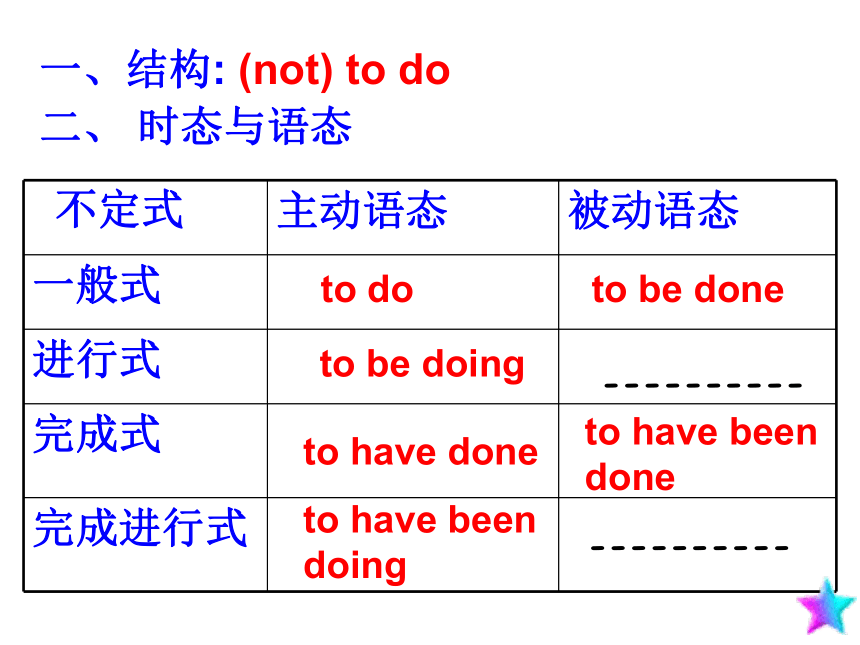
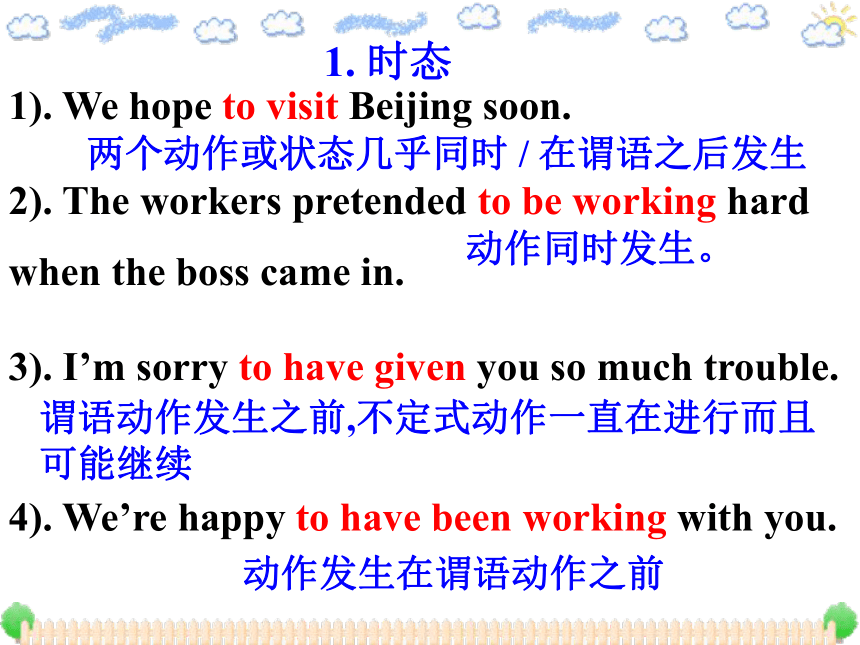
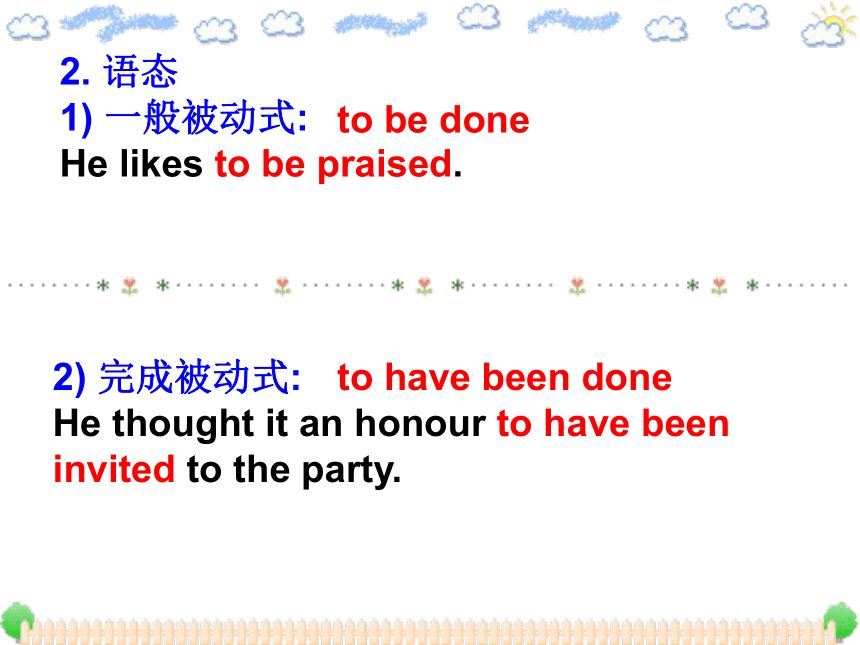
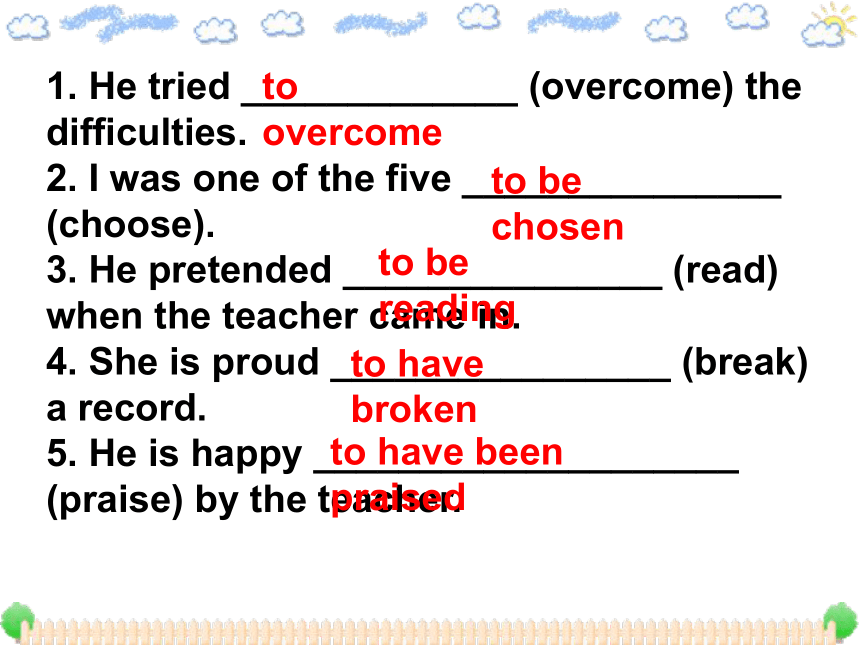
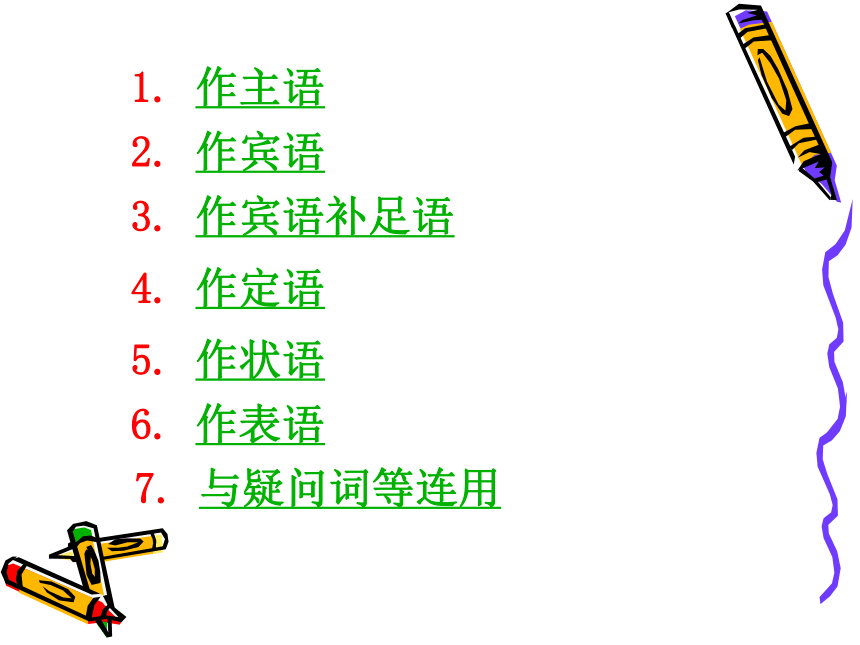
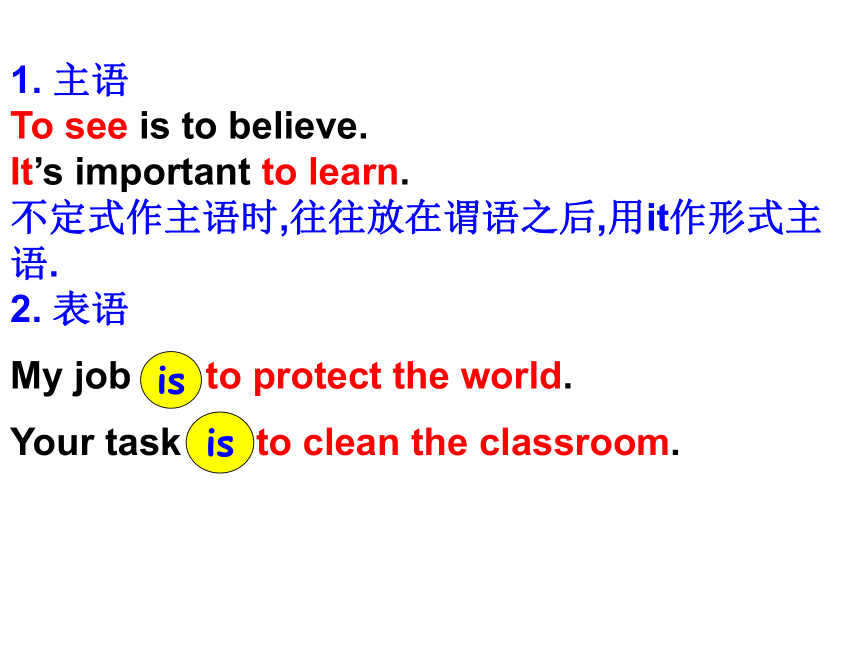
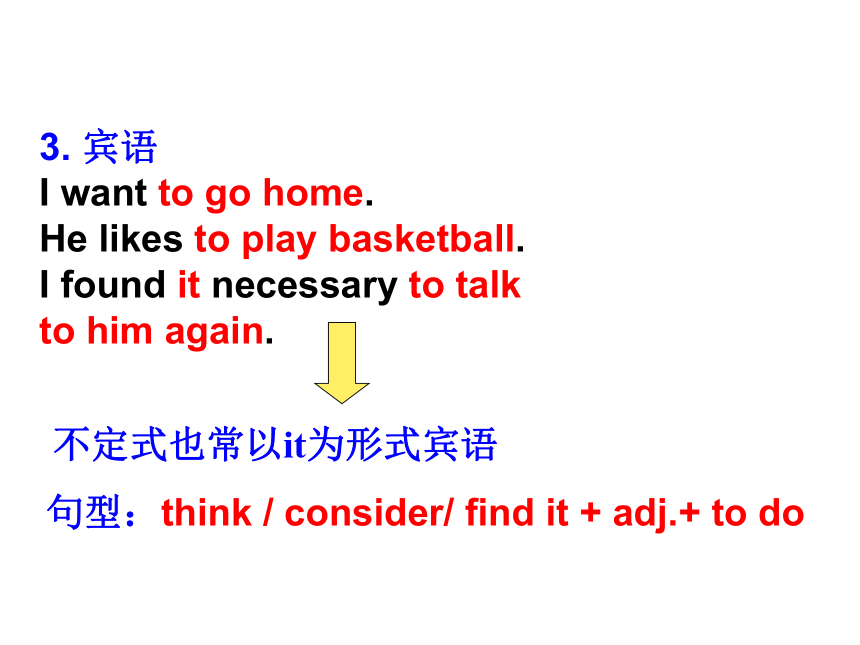
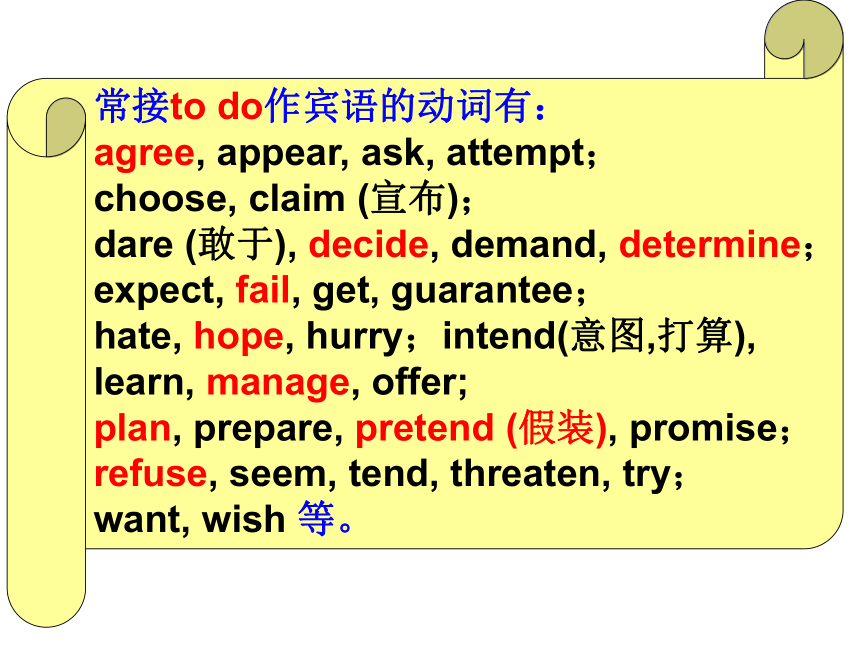
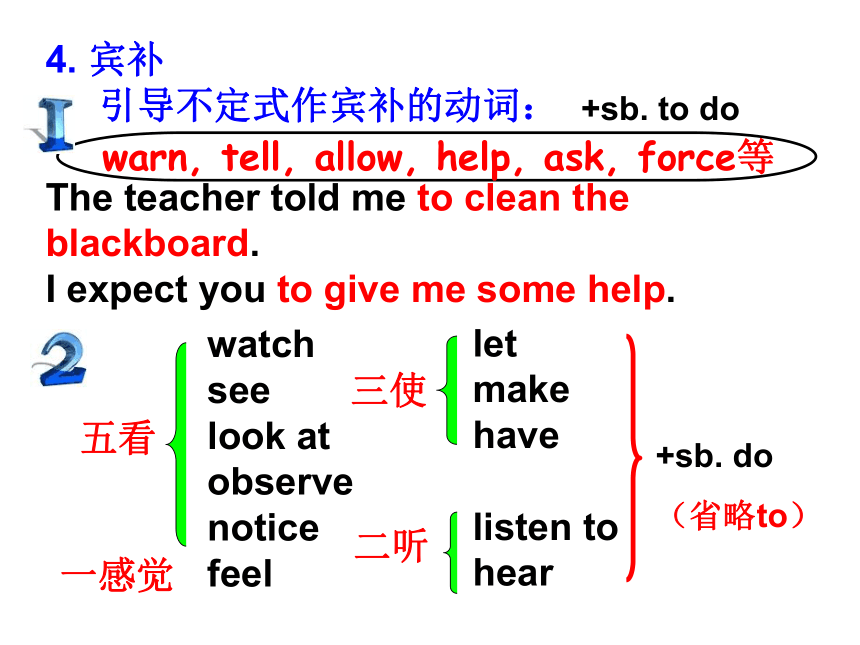
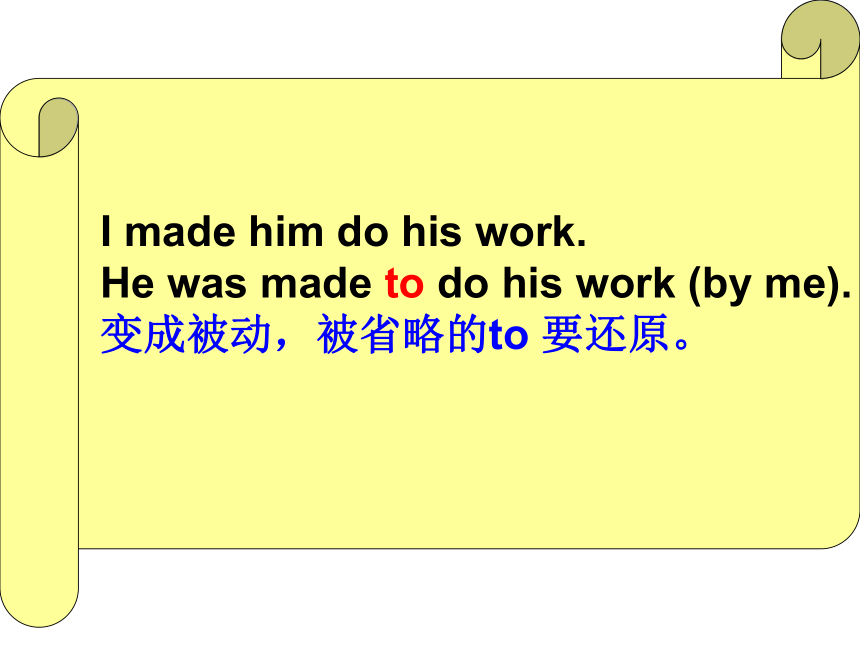

文档简介
课件52张PPT。动词不定式一、结构: (not) to do
二、 时态与语态不定式 to do to be done to be doing to have done to have been
done to have been
doing--------------------1). We hope to visit Beijing soon.
2). The workers pretended to be working hard when the boss came in.
3). I’m sorry to have given you so much trouble.
4). We’re happy to have been working with you.两个动作或状态几乎同时 / 在谓语之后发生动作同时发生。动作发生在谓语动作之前谓语动作发生之前,不定式动作一直在进行而且可能继续1. 时态2. 语态
1) 一般被动式:
He likes to be praised.to be done2) 完成被动式:
He thought it an honour to have been invited to the party.to have been done1. He tried _____________ (overcome) the difficulties.
2. I was one of the five _______________ (choose).
3. He pretended _______________ (read) when the teacher came in.
4. She is proud ________________ (break) a record.
5. He is happy ____________________ (praise) by the teacher.to overcometo be chosento be readingto have brokento have been praised1. 作主语2. 作宾语3. 作宾语补足语4. 作定语5. 作状语6. 作表语7. 与疑问词等连用1. 主语
To see is to believe.
It’s important to learn.
不定式作主语时,往往放在谓语之后,用it作形式主语.
2. 表语
My job to protect the world.
Your task to clean the classroom.isis3. 宾语
I want to go home.
He likes to play basketball.
I found it necessary to talk to him again.句型:think / consider/ find it + adj.+ to do 不定式也常以it为形式宾语常接to do作宾语的动词有:
agree, appear, ask, attempt;
choose, claim (宣布);
dare (敢于), decide, demand, determine;expect, fail, get, guarantee;
hate, hope, hurry;intend(意图,打算), learn, manage, offer;
plan, prepare, pretend (假装), promise;
refuse, seem, tend, threaten, try;
want, wish 等。4. 宾补
引导不定式作宾补的动词:
The teacher told me to clean the blackboard.
I expect you to give me some help.五看watch
see
look at
observe
notice
feel三使let
make
have
listen to
hear二听一感觉 warn, tell, allow, help, ask, force等+sb. do
(省略to)+sb. to doI made him do his work.
He was made to do his work (by me).
变成被动,被省略的to 要还原。I have a lot of work to do.
我有很多工作要做。
He is always the first to come.
他总是第一个来。
We all have a chance to go to college.
我们都有上大学的机会。
Ladies and gentlemen ,I have something important to tell you .5. 定语 (常常表示将来的动作)
不定式作定语时,应放在被修饰词的后面,而且放在其他后置定语之后。2. 当名词被the first ,the last, the only 等词以及形容词最高级修饰时
eg: She is always the first to come and the last to leave.
The last one to leave the classroom should turn off the light. 3.也可用在have… to do和there be句型中。 There is no one to take care of her.
I have no jewelry to wear.4. 如果不定式是不及物动词,则后面需适当的介词
Please pass me some paper to write____.
She has a nice pen to write _____.
He bought a flat for the family to live ____.onwithineg: He spoke loudly (so as / in order) to be
heard.6. 作状语1. 表示目的: to / in order to / so as to2. 表示原因
不定式可以用在作表语的形容词后作状语, sorry, surprised, happy, glad, eager, angry, foolish, right, wrong, slow, quick, rude, cruel, disappointed等。eg: I’m glad/pleased to see you.
We were surprised to hear the news.3.结果状语:
so + adj. / adv. + as to do…
such + adj. + n. +as to do…
adj. / adv.+ enough + to do
too + adv. / adj. +to do③ We hurried to the station only to find the
train had left. He was so foolish as to believe it.
= He was such a fool as to believe it.
= He was foolish enough to believe it. I’m too tired to walk any further tonight.①②7.独立结构to be frank,
to be honest,
to tell (you) the truthTo tell the truth, I am not happy at the moment.8. 不定式与疑问词who,which, when, how, what等连用,在句中起名词作用,可充当主语、表语、宾语等。
He didn’t know what to say.
他不知道说什么。(宾语)
How to solve the problem is very important.
如何解决这个问题很重要。(主语)
My question is when to start.
我的问题是什么时候开始。(表语)
注意:用于why或why not开头的简短疑问句中,后面紧跟的动词不定式不带to。
Why not have a rest?9. 不定式的省略
1) 不定式中的动词上文已出现过,下文要省略该动词.
Would you like to go with me?
I’d like to.
2) 不定式是to be 结构, be 不可省.
Would you like to be a teacher?
I’d like to be.固定句型:had better/had best + (not) do sth. 最好(不)做某事
Why (not) do sth.?
…prefer to do
…prefer + n./doing A + to + n./doing B
…prefer to do A rather than (to) do B
…would rather (not) do sth.
…would rather do A than (do) B
…would rather + 句子(过去式)
(虚拟语气)要做……1. 动词后面跟动名词还是不定式,含义不相同,总的来说,表示习惯的, 一般性的动作多跟动名词,一次性的具体的被动动作多跟不定式。
I like to go with you.
我想和你一块儿去。
I like reading.
我喜欢阅读。
He promised to help her.
他答应过要帮助她。
We love watching VCD.
我们喜欢看VCD。 2. remember, forget, regret + doing
表示已经做了
+ to do表示还没做
I remember meeting him in the street.
我记得在街上见过他。
I remember to write a letter to my parents.
我想起来要给我父母亲写信。
3. stop doing表示停止正在做的动作
stop to do表示停下来去做
Stop smoking, please.
请不要抽烟 。
Let's stop to have a rest.
咱们停下来休息一下吧。 4. mean to do 打算做某事
mean doing 意味着……
I meant to catch up with the early bus.
This means wasting a lot of money.
5. try to do 设法尽力做某事
try doing 试着做某事
You should try to overcome your shortcomings.
Try working out the physics problem in another way.Marty says
…Have A L k1.Unfortunately, the doctors don’t know know how to make me better, but I am very outgoing and have learned to adapt to my disability.
2. I used to climb trees, swim and play football.
3. Then I started to get weaker and weaker.Have A L k4. Even after all that, no one could give my disease a name and it is difficult to know what the future holds.
5. Sometimes, too, I was too weak to go to school …
6.My ambition is to work for a firm that develops computer software when I grow up. Have A L k7. Last year I invented…and a big company has decided to buy it from me.
8. I have to work hard to live a normal life but it has been worth it.
9. If I had a chance to say one thing to healthy children, it would be this: …
10. Just accept them for who they are and give them encouragement to live as rich and full a life as you do.介词 Exercise选择题
1. Our master often told us ___ things for granted.
A. to not tave B. not to take
C. didn’t take D. not take
2. Mrs. Smith warned her daughter _____ after drinking.
A. Never to drive B. to never drive
C. never driving D. never driveAB3. Though he had often made his little sister _____, today he was made _____ by his little sister.
A. cry, to cry B. crying, crying
C. cry, cry D. to cry, cry
4. “Have you decided when _____?”
“Yes, tomorrow morning.”
A. to leave B. to be leaving
C. will you leave D. are you leaving
5. She pretended _____ me when I passed by.
A. not to see B. not seeing
C. to not see D. having not seenAAA6. – The light in the office is still on.
-- Oh, I forgot _______.
A. turning it off B. turn it off
C. to turn it off D. having turned it off
7. Go on ______ the other exercise after you have finished this one.
A. to do B. doing C. with D. to be doing
8. She reached the top of the hill and stopped_______ on a big rock by the side of the path.
A. to have rested B. resting
C. to rest D. restACC 用正确的词的形式填空。
1. Robert is said ______________ (study) abroad, but I don’t know what country he studied in.
2. The purpose of new technologies is to make life easier, _____________ (make) it more difficult.
3. I’ve worked with children before, so I know what ___________ (expect) in my new job.
4. Having a trip abroad is certainly good for the old couple, but it remains ___________ (see) whether they will enjoy it.to have studiednot to maketo expectto be seen5. It is said in Australia there is more land than the government knows ________________. (what, do with)
6. The mother didn’t know who _________ (blame) for the broken glass as it happened while she was out.
7. Paul doesn’t have to be made ________ (learn). He always works hard.
8. We agreed __________ (meet) here but so far she hasn’t turned up yet.
9. The boy wanted to ride his bicycle in the street, but his mother told him __________.
to learnto meetto blamenot towhat to do with it10. The patient was warned ___________ (eat) oily food after the operation.
11. I would love ______________ (go) to the party last night but I had to work extra hours to finish a report.
12. Charles Babbage is generally considered ________________ (invent) the first computer.
13. Little Jim should love ____________ (take) to the theatre this evening.
14. ____________ (sleep) late in the afternoon, Bob turned off the alarm. to have goneto have inventedto be takenTo sleepnot to eat15. The teacher asked us ____________ (make) so much noise.
16. They watered the soil _________ (stop) it getting too dry.
17. The little boy is old enough ________ (go) to school.
18. Your sister is said ____________ (take) a plane before.
19. I want ___________ (travel) around the world.
20. When I came in, he pretended _____________ (read) a book. to stopto have takento be readingto travelledto gonot to make21. “I want the document _____________ (print) at once.” said the boss angrily.
22. He is wondering where ________ (find) his lost bike.
23. We used to hear her ______ (sing) this song.
24. The meeting ___________ (hold) next week is very important.
25. The dusty air makes it difficult ________ (get) a clear picture of space.
26.He was seen ________ (enter) the room an hour ago.singto be heldto getto enterto be printedto find27. He is always the first _________ (come) to school
28. I have something important _______ (tell) you.
29. She feels excited ________________ (pass) the driven test.
30. _________ (make) a living, she had to work from morning till night.
31. My teacher was made __________ (give up) his teaching because of poor health.
32. The sentence wants ____________ (explain) once more.To maketo cometo tellto have passedto give upexplaining33.The Arctic is considered ________ (be) the northern part of the Atlantic.
34.The Emperor ordered the wonderful cloth _____________ (weave) for him without delay.
35.---How do you deal with the disagreement between the company and the customers?
---The key __________ (solve) the problem is to meet the demand ________ (make) by the customers.to beto be wovento solvingmade36. ---What do you think of the school?
----It is a very good school ________ (study) in.
37. ---Did you get a job?
--- No, I ________ (try), but it’s no use.
38.We find it impossible for the work _____________ (finish) ahead of time.
39.---I usually go to Shanghai by train.
----Why not _________ (try, go) there by boat for a change?
40. I would rather starve to death than _______ (beg) for food.try goingbegto studytried toto be finished以下选择与前面填空1-15相同1. Robert is said ____ abroad, but I don’t know what country he studied in.
to have studied B. to study
C. to be studying D. to have been studying
2. The purpose of new technologies is to make life easier, ____ it more difficult.
not make B. not to make
C. not making D. don’t make
3. I’ve worked with children before, so I know what ____ in my new job.
expected B. to expect
C. to be expecting D. expects4. Having a trip abroad is certainly good for the old couple, but it remains ____ whether they will enjoy it.
A. to see B. to be seen
C. seeing D. see
5. It is said in Australia there is more land than the government knows ____.
A. it what to do with B. what to do with it
C. what to do it with D. to do what with it
6. The mother didn’t know ____ to blame for the broken glass as it happened while she was out.
A. who B. when C. how D. why 7. Paul doesn’t have to be made ____. He always works hard.
A. learn B. to learn
C. learned D. learning
8. We agreed ____ here but so far she hasn’t turned up yet.
A. having met B. meeting
C. to meet D. to have met
9. The boy wanted to ride his bicycle in the street, but his mother told him ____.
A. not to B. not to do
C. not do it D. do not to10. The patient was warned ____ oily food after the operation.
A. to eat not B.eating not
C. not to eat D.not eating
11. I would love ____ to the party last night but I had to work extra hours to finish a report.
A. to go B. to have gone
C. going D. having gone
12. Charles Babbage is generally considered ____ the first computer.
A. to invent B. inventing
C. to have invented D. having invented13. Little Jim should love ____ to the theatre this evening.
A. to be taken B. to take
C. being taken D. taking
14. ____ late in the afternoon, Bob turned off the alarm.
A. To sleep B. Sleeping
C. Sleep D. Having sleep
15. The teacher asked us ____ so much noise.
A. don’t make B. not make
C. not making D. not to makeafford, agree, appear, arrange, ask, attempt, care, choose, claim, come, consent, dare, decide, demand, deserve, determine, elect, endeavor, expect, fail, get, guarantee, hate, help, hesitate hope, hurry, intend, learn, long, manage, mean, need, offer, plan, prepare, pretend, promise refuse, say, seem, tend, threaten, want, wish The following verbs are normally followed by the infinitive. The following verbs are normally followed by the Gerund.
avoid, consider, delay, deny, dislike, endure, enjoy, escape, forgive, finish, imagine, keep, mind, miss, pardon, prevent, resist, suggest, understand, can’t help
The following verbs are normally followed by the Gerund or the infinitive.
love, like, hate, prefer, dislike, begin, continue, intend, attempt, propose, want, need, remember, forget, regret, try, deserve, startP6 Ex2
He was overheard _______(say) that he hoped John would resign.
Peter was made _________(wait) outside.
He was heard __________(unlock) the door and go out.
The man was seen ________( shoot) the woman on the street.
The old lady was noticed _________(wipe) her face with a handkerchief.to sayto waitto unlockto shootto wipeP49 Ex 1
1. I forgot to ask you to go to the bank.
2. It is very important to turn off / switch off the electricity before you check the machine.
3. I know how to make a mouse out of / with my handkerchief.
4. Luckily, we don’t have much more work to do.
5. She is very pleased / happy to have the opportunity / chance to travel while she is young.
6. She has been very successful in her work and now her greatest wish is to get married and have a child.P49 Ex.2 &3
1. … started pushing/ to push…
2. … promised to go…
3. … advise you to eat…
4. … began shouting/to shout…
5. … avoid falling …
6. … forget to call…
7. … felt like throwing…
8. … let them stay…
1. a. to tell b. spending
2. a. putting b. to check
3. a. talking b. to make c. to drink
4. a. to get b. thinking1) 作定语的不定式中的动词如果是不及物动词,或者不定式所修饰的名词或代词是不定式动作的地点、工具等,不定式后面须有相应的介词。
He is looking for a room to live in.
There is nothing to worry about.
Do you have anything to say on the question?
请给我一支写字的笔。
Please give me a pen to write with.
二、 时态与语态不定式 to do to be done to be doing to have done to have been
done to have been
doing--------------------1). We hope to visit Beijing soon.
2). The workers pretended to be working hard when the boss came in.
3). I’m sorry to have given you so much trouble.
4). We’re happy to have been working with you.两个动作或状态几乎同时 / 在谓语之后发生动作同时发生。动作发生在谓语动作之前谓语动作发生之前,不定式动作一直在进行而且可能继续1. 时态2. 语态
1) 一般被动式:
He likes to be praised.to be done2) 完成被动式:
He thought it an honour to have been invited to the party.to have been done1. He tried _____________ (overcome) the difficulties.
2. I was one of the five _______________ (choose).
3. He pretended _______________ (read) when the teacher came in.
4. She is proud ________________ (break) a record.
5. He is happy ____________________ (praise) by the teacher.to overcometo be chosento be readingto have brokento have been praised1. 作主语2. 作宾语3. 作宾语补足语4. 作定语5. 作状语6. 作表语7. 与疑问词等连用1. 主语
To see is to believe.
It’s important to learn.
不定式作主语时,往往放在谓语之后,用it作形式主语.
2. 表语
My job to protect the world.
Your task to clean the classroom.isis3. 宾语
I want to go home.
He likes to play basketball.
I found it necessary to talk to him again.句型:think / consider/ find it + adj.+ to do 不定式也常以it为形式宾语常接to do作宾语的动词有:
agree, appear, ask, attempt;
choose, claim (宣布);
dare (敢于), decide, demand, determine;expect, fail, get, guarantee;
hate, hope, hurry;intend(意图,打算), learn, manage, offer;
plan, prepare, pretend (假装), promise;
refuse, seem, tend, threaten, try;
want, wish 等。4. 宾补
引导不定式作宾补的动词:
The teacher told me to clean the blackboard.
I expect you to give me some help.五看watch
see
look at
observe
notice
feel三使let
make
have
listen to
hear二听一感觉 warn, tell, allow, help, ask, force等+sb. do
(省略to)+sb. to doI made him do his work.
He was made to do his work (by me).
变成被动,被省略的to 要还原。I have a lot of work to do.
我有很多工作要做。
He is always the first to come.
他总是第一个来。
We all have a chance to go to college.
我们都有上大学的机会。
Ladies and gentlemen ,I have something important to tell you .5. 定语 (常常表示将来的动作)
不定式作定语时,应放在被修饰词的后面,而且放在其他后置定语之后。2. 当名词被the first ,the last, the only 等词以及形容词最高级修饰时
eg: She is always the first to come and the last to leave.
The last one to leave the classroom should turn off the light. 3.也可用在have… to do和there be句型中。 There is no one to take care of her.
I have no jewelry to wear.4. 如果不定式是不及物动词,则后面需适当的介词
Please pass me some paper to write____.
She has a nice pen to write _____.
He bought a flat for the family to live ____.onwithineg: He spoke loudly (so as / in order) to be
heard.6. 作状语1. 表示目的: to / in order to / so as to2. 表示原因
不定式可以用在作表语的形容词后作状语, sorry, surprised, happy, glad, eager, angry, foolish, right, wrong, slow, quick, rude, cruel, disappointed等。eg: I’m glad/pleased to see you.
We were surprised to hear the news.3.结果状语:
so + adj. / adv. + as to do…
such + adj. + n. +as to do…
adj. / adv.+ enough + to do
too + adv. / adj. +to do③ We hurried to the station only to find the
train had left. He was so foolish as to believe it.
= He was such a fool as to believe it.
= He was foolish enough to believe it. I’m too tired to walk any further tonight.①②7.独立结构to be frank,
to be honest,
to tell (you) the truthTo tell the truth, I am not happy at the moment.8. 不定式与疑问词who,which, when, how, what等连用,在句中起名词作用,可充当主语、表语、宾语等。
He didn’t know what to say.
他不知道说什么。(宾语)
How to solve the problem is very important.
如何解决这个问题很重要。(主语)
My question is when to start.
我的问题是什么时候开始。(表语)
注意:用于why或why not开头的简短疑问句中,后面紧跟的动词不定式不带to。
Why not have a rest?9. 不定式的省略
1) 不定式中的动词上文已出现过,下文要省略该动词.
Would you like to go with me?
I’d like to.
2) 不定式是to be 结构, be 不可省.
Would you like to be a teacher?
I’d like to be.固定句型:had better/had best + (not) do sth. 最好(不)做某事
Why (not) do sth.?
…prefer to do
…prefer + n./doing A + to + n./doing B
…prefer to do A rather than (to) do B
…would rather (not) do sth.
…would rather do A than (do) B
…would rather + 句子(过去式)
(虚拟语气)要做……1. 动词后面跟动名词还是不定式,含义不相同,总的来说,表示习惯的, 一般性的动作多跟动名词,一次性的具体的被动动作多跟不定式。
I like to go with you.
我想和你一块儿去。
I like reading.
我喜欢阅读。
He promised to help her.
他答应过要帮助她。
We love watching VCD.
我们喜欢看VCD。 2. remember, forget, regret + doing
表示已经做了
+ to do表示还没做
I remember meeting him in the street.
我记得在街上见过他。
I remember to write a letter to my parents.
我想起来要给我父母亲写信。
3. stop doing表示停止正在做的动作
stop to do表示停下来去做
Stop smoking, please.
请不要抽烟 。
Let's stop to have a rest.
咱们停下来休息一下吧。 4. mean to do 打算做某事
mean doing 意味着……
I meant to catch up with the early bus.
This means wasting a lot of money.
5. try to do 设法尽力做某事
try doing 试着做某事
You should try to overcome your shortcomings.
Try working out the physics problem in another way.Marty says
…Have A L k1.Unfortunately, the doctors don’t know know how to make me better, but I am very outgoing and have learned to adapt to my disability.
2. I used to climb trees, swim and play football.
3. Then I started to get weaker and weaker.Have A L k4. Even after all that, no one could give my disease a name and it is difficult to know what the future holds.
5. Sometimes, too, I was too weak to go to school …
6.My ambition is to work for a firm that develops computer software when I grow up. Have A L k7. Last year I invented…and a big company has decided to buy it from me.
8. I have to work hard to live a normal life but it has been worth it.
9. If I had a chance to say one thing to healthy children, it would be this: …
10. Just accept them for who they are and give them encouragement to live as rich and full a life as you do.介词 Exercise选择题
1. Our master often told us ___ things for granted.
A. to not tave B. not to take
C. didn’t take D. not take
2. Mrs. Smith warned her daughter _____ after drinking.
A. Never to drive B. to never drive
C. never driving D. never driveAB3. Though he had often made his little sister _____, today he was made _____ by his little sister.
A. cry, to cry B. crying, crying
C. cry, cry D. to cry, cry
4. “Have you decided when _____?”
“Yes, tomorrow morning.”
A. to leave B. to be leaving
C. will you leave D. are you leaving
5. She pretended _____ me when I passed by.
A. not to see B. not seeing
C. to not see D. having not seenAAA6. – The light in the office is still on.
-- Oh, I forgot _______.
A. turning it off B. turn it off
C. to turn it off D. having turned it off
7. Go on ______ the other exercise after you have finished this one.
A. to do B. doing C. with D. to be doing
8. She reached the top of the hill and stopped_______ on a big rock by the side of the path.
A. to have rested B. resting
C. to rest D. restACC 用正确的词的形式填空。
1. Robert is said ______________ (study) abroad, but I don’t know what country he studied in.
2. The purpose of new technologies is to make life easier, _____________ (make) it more difficult.
3. I’ve worked with children before, so I know what ___________ (expect) in my new job.
4. Having a trip abroad is certainly good for the old couple, but it remains ___________ (see) whether they will enjoy it.to have studiednot to maketo expectto be seen5. It is said in Australia there is more land than the government knows ________________. (what, do with)
6. The mother didn’t know who _________ (blame) for the broken glass as it happened while she was out.
7. Paul doesn’t have to be made ________ (learn). He always works hard.
8. We agreed __________ (meet) here but so far she hasn’t turned up yet.
9. The boy wanted to ride his bicycle in the street, but his mother told him __________.
to learnto meetto blamenot towhat to do with it10. The patient was warned ___________ (eat) oily food after the operation.
11. I would love ______________ (go) to the party last night but I had to work extra hours to finish a report.
12. Charles Babbage is generally considered ________________ (invent) the first computer.
13. Little Jim should love ____________ (take) to the theatre this evening.
14. ____________ (sleep) late in the afternoon, Bob turned off the alarm. to have goneto have inventedto be takenTo sleepnot to eat15. The teacher asked us ____________ (make) so much noise.
16. They watered the soil _________ (stop) it getting too dry.
17. The little boy is old enough ________ (go) to school.
18. Your sister is said ____________ (take) a plane before.
19. I want ___________ (travel) around the world.
20. When I came in, he pretended _____________ (read) a book. to stopto have takento be readingto travelledto gonot to make21. “I want the document _____________ (print) at once.” said the boss angrily.
22. He is wondering where ________ (find) his lost bike.
23. We used to hear her ______ (sing) this song.
24. The meeting ___________ (hold) next week is very important.
25. The dusty air makes it difficult ________ (get) a clear picture of space.
26.He was seen ________ (enter) the room an hour ago.singto be heldto getto enterto be printedto find27. He is always the first _________ (come) to school
28. I have something important _______ (tell) you.
29. She feels excited ________________ (pass) the driven test.
30. _________ (make) a living, she had to work from morning till night.
31. My teacher was made __________ (give up) his teaching because of poor health.
32. The sentence wants ____________ (explain) once more.To maketo cometo tellto have passedto give upexplaining33.The Arctic is considered ________ (be) the northern part of the Atlantic.
34.The Emperor ordered the wonderful cloth _____________ (weave) for him without delay.
35.---How do you deal with the disagreement between the company and the customers?
---The key __________ (solve) the problem is to meet the demand ________ (make) by the customers.to beto be wovento solvingmade36. ---What do you think of the school?
----It is a very good school ________ (study) in.
37. ---Did you get a job?
--- No, I ________ (try), but it’s no use.
38.We find it impossible for the work _____________ (finish) ahead of time.
39.---I usually go to Shanghai by train.
----Why not _________ (try, go) there by boat for a change?
40. I would rather starve to death than _______ (beg) for food.try goingbegto studytried toto be finished以下选择与前面填空1-15相同1. Robert is said ____ abroad, but I don’t know what country he studied in.
to have studied B. to study
C. to be studying D. to have been studying
2. The purpose of new technologies is to make life easier, ____ it more difficult.
not make B. not to make
C. not making D. don’t make
3. I’ve worked with children before, so I know what ____ in my new job.
expected B. to expect
C. to be expecting D. expects4. Having a trip abroad is certainly good for the old couple, but it remains ____ whether they will enjoy it.
A. to see B. to be seen
C. seeing D. see
5. It is said in Australia there is more land than the government knows ____.
A. it what to do with B. what to do with it
C. what to do it with D. to do what with it
6. The mother didn’t know ____ to blame for the broken glass as it happened while she was out.
A. who B. when C. how D. why 7. Paul doesn’t have to be made ____. He always works hard.
A. learn B. to learn
C. learned D. learning
8. We agreed ____ here but so far she hasn’t turned up yet.
A. having met B. meeting
C. to meet D. to have met
9. The boy wanted to ride his bicycle in the street, but his mother told him ____.
A. not to B. not to do
C. not do it D. do not to10. The patient was warned ____ oily food after the operation.
A. to eat not B.eating not
C. not to eat D.not eating
11. I would love ____ to the party last night but I had to work extra hours to finish a report.
A. to go B. to have gone
C. going D. having gone
12. Charles Babbage is generally considered ____ the first computer.
A. to invent B. inventing
C. to have invented D. having invented13. Little Jim should love ____ to the theatre this evening.
A. to be taken B. to take
C. being taken D. taking
14. ____ late in the afternoon, Bob turned off the alarm.
A. To sleep B. Sleeping
C. Sleep D. Having sleep
15. The teacher asked us ____ so much noise.
A. don’t make B. not make
C. not making D. not to makeafford, agree, appear, arrange, ask, attempt, care, choose, claim, come, consent, dare, decide, demand, deserve, determine, elect, endeavor, expect, fail, get, guarantee, hate, help, hesitate hope, hurry, intend, learn, long, manage, mean, need, offer, plan, prepare, pretend, promise refuse, say, seem, tend, threaten, want, wish The following verbs are normally followed by the infinitive. The following verbs are normally followed by the Gerund.
avoid, consider, delay, deny, dislike, endure, enjoy, escape, forgive, finish, imagine, keep, mind, miss, pardon, prevent, resist, suggest, understand, can’t help
The following verbs are normally followed by the Gerund or the infinitive.
love, like, hate, prefer, dislike, begin, continue, intend, attempt, propose, want, need, remember, forget, regret, try, deserve, startP6 Ex2
He was overheard _______(say) that he hoped John would resign.
Peter was made _________(wait) outside.
He was heard __________(unlock) the door and go out.
The man was seen ________( shoot) the woman on the street.
The old lady was noticed _________(wipe) her face with a handkerchief.to sayto waitto unlockto shootto wipeP49 Ex 1
1. I forgot to ask you to go to the bank.
2. It is very important to turn off / switch off the electricity before you check the machine.
3. I know how to make a mouse out of / with my handkerchief.
4. Luckily, we don’t have much more work to do.
5. She is very pleased / happy to have the opportunity / chance to travel while she is young.
6. She has been very successful in her work and now her greatest wish is to get married and have a child.P49 Ex.2 &3
1. … started pushing/ to push…
2. … promised to go…
3. … advise you to eat…
4. … began shouting/to shout…
5. … avoid falling …
6. … forget to call…
7. … felt like throwing…
8. … let them stay…
1. a. to tell b. spending
2. a. putting b. to check
3. a. talking b. to make c. to drink
4. a. to get b. thinking1) 作定语的不定式中的动词如果是不及物动词,或者不定式所修饰的名词或代词是不定式动作的地点、工具等,不定式后面须有相应的介词。
He is looking for a room to live in.
There is nothing to worry about.
Do you have anything to say on the question?
请给我一支写字的笔。
Please give me a pen to write with.
